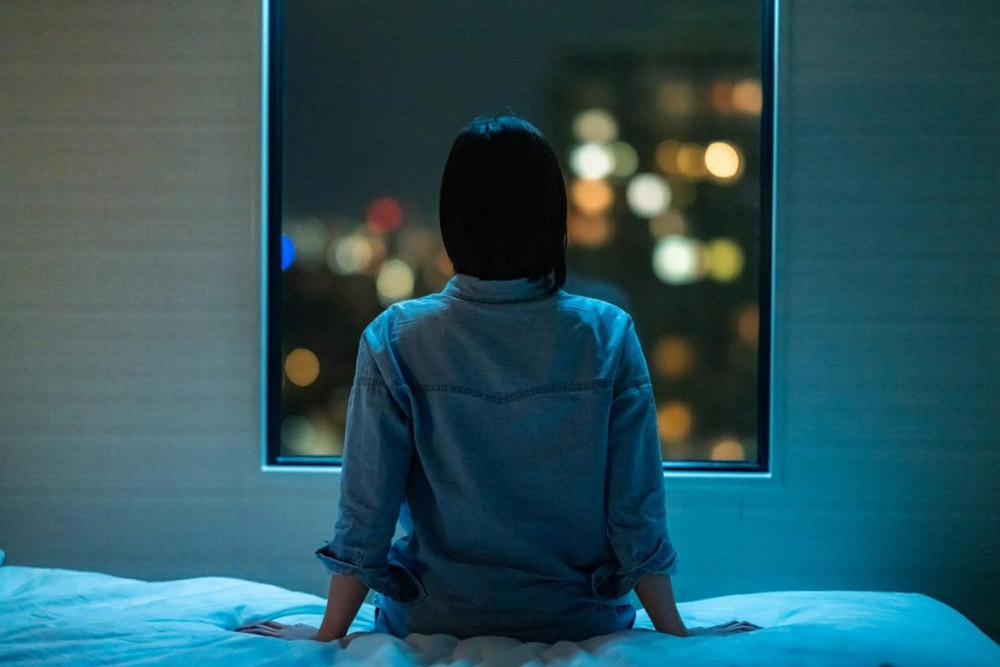
你是那種聽(tīng)到“早起的鳥(niǎo)兒有蟲(chóng)吃”這類(lèi)俗語(yǔ)就心生抵觸(甚至?xí)蚬罚┑囊关堊訂??若是如此,,馬修·沃克(Matt Walker)對(duì)你的處境感同身受。
上周在紐約舉行的Equinox全球睡眠研討會(huì)上,,著名睡眠研究專(zhuān)家沃克對(duì)聽(tīng)眾說(shuō):“我們斥責(zé)夜貓子懶惰或懈怠,,但這并非他們的過(guò)錯(cuò)?!?/p>
這是因?yàn)槟愫螘r(shí)需要入眠取決于所謂的“睡眠類(lèi)型”——即身體對(duì)一天中特定時(shí)段的本能偏好,。他解釋說(shuō),這在很大程度上是由基因決定的,。
加州大學(xué)伯克利分校神經(jīng)科學(xué)和心理學(xué)教授,、人類(lèi)睡眠科學(xué)中心創(chuàng)始人兼主任沃克說(shuō):“個(gè)體睡眠類(lèi)型存在顯著差異,關(guān)鍵在于遵循自身睡眠類(lèi)型規(guī)律作息,?!?
他在研討會(huì)上表示:“當(dāng)下社會(huì)普遍偏愛(ài)早起型人群,源于人們秉持‘A型人格者理應(yīng)獲得嘉獎(jiǎng)’的觀念,?!边z憾的是,他也坦言:“我們對(duì)夜貓子群體存有偏見(jiàn),?!?/p>
鑒于社會(huì)普遍存在沃克所說(shuō)的“競(jìng)爭(zhēng)性睡眠不足”現(xiàn)象,即吹噓自己黎明即起或僅需四小時(shí)睡眠,,上述情況尤為明顯,。他指出,這類(lèi)行為背后隱含的觀念是“我事務(wù)繁忙,、舉足輕重,,這就是我睡眠很少的原因”。雖然確實(shí)存在所謂的“天生短睡眠者”,,但這種人極為罕見(jiàn)——比被閃電擊中的概率還低,。通常而言,人們每晚需要保證七到九小時(shí)的休息時(shí)間。
還有一種誤解是,,當(dāng)夜貓子熬夜后又早起,,其他人便認(rèn)定他們所需睡眠時(shí)間較少。但實(shí)際上,,他解釋說(shuō):“他們只是被迫在錯(cuò)誤時(shí)段入眠,。”
以下為您介紹關(guān)于睡眠類(lèi)型所需了解的一切,,以及如何拋開(kāi)外界干擾,,保障自身獲得充足睡眠。
什么是睡眠類(lèi)型,?
沃克解釋說(shuō):“睡眠類(lèi)型指的是個(gè)人偏好的睡眠和活動(dòng)時(shí)段,。”他指出,,睡眠類(lèi)型約40%到50%受基因影響,,且會(huì)隨年齡增長(zhǎng)自然改變——青少年時(shí)期傾向于晚睡,而成年時(shí)期則傾向于早起,。睡眠類(lèi)型與晝夜節(jié)律(即人體24小時(shí)生物鐘)不能混為一談:晝夜節(jié)律在個(gè)體間差異較小,,而睡眠類(lèi)型則是在這一框架內(nèi)形成的個(gè)性化特征。
睡眠類(lèi)型可以改變嗎,?
雖然永久性改變個(gè)體睡眠類(lèi)型可能頗具挑戰(zhàn)性,,但研究表明適度調(diào)整是可行的——包括一項(xiàng)研究顯示,通過(guò)規(guī)律的作息安排和光照調(diào)節(jié),,夜貓子的睡眠-覺(jué)醒模式能夠提前兩小時(shí),。但沃克認(rèn)為,要維持這種改變需要持續(xù)且嚴(yán)苛的干預(yù),,這使得長(zhǎng)期改變“根本無(wú)法實(shí)現(xiàn)”,。 “應(yīng)讓夜貓子順應(yīng)自身生理規(guī)律入眠。至少,,基于科學(xué)和醫(yī)學(xué)數(shù)據(jù),,我是這樣認(rèn)為的?!?/p>
違背自身睡眠類(lèi)型睡眠會(huì)有什么后果,?
沃克解釋說(shuō),違背自身睡眠類(lèi)型作息會(huì)引發(fā)問(wèn)題,,不僅會(huì)導(dǎo)致疲憊不堪,,還可能誘發(fā)疾病。
大量研究表明,,相較于早起人群,,夜貓子罹患糖尿病的風(fēng)險(xiǎn)高出30%,,出現(xiàn)心理疾病(如抑郁癥)的幾率近乎前者的兩倍,,全因死亡率高出10%,,患心臟病的風(fēng)險(xiǎn)也會(huì)增加。為了適應(yīng)與自身睡眠類(lèi)型錯(cuò)位的作息安排,,他們每天攝入的咖啡因也明顯更多,。
沃克對(duì)《財(cái)富》雜志表示:“至少在我看來(lái),所有這些證據(jù)都表明,,當(dāng)我們違背自身睡眠類(lèi)型作息時(shí),,隨之而來(lái)的睡眠紊亂將帶來(lái)嚴(yán)重后果?!?/p>
給被迫違背自身生物鐘類(lèi)型睡眠者的建議
針對(duì)需早起上班的夜貓子和需上夜班的早起者,,沃克給出如下建議:
? 盡可能保持每天睡眠-覺(jué)醒時(shí)間一致,偏差控制在正負(fù)25分鐘以內(nèi),。
? 借助晨間強(qiáng)光照射,調(diào)節(jié)生物鐘,,使其提前,。
? 考慮在傍晚時(shí)分服用低劑量褪黑素,以幫助更早入睡,。
? 優(yōu)化睡眠環(huán)境,,并謹(jǐn)慎控制咖啡因攝入。
沃克建議:“倘若你能適度調(diào)整作息,,使其更貼合自身天然的睡眠類(lèi)型,,那么因睡眠類(lèi)型引發(fā)的風(fēng)險(xiǎn)通常會(huì)有所降低。我明白這并非易事,,但即便每天僅調(diào)整15到20分鐘,,也是良好的開(kāi)端。日積月累,,效果就如同優(yōu)質(zhì)投資帶來(lái)的復(fù)利一樣,!” (財(cái)富中文網(wǎng))
譯者:中慧言-王芳
你是那種聽(tīng)到“早起的鳥(niǎo)兒有蟲(chóng)吃”這類(lèi)俗語(yǔ)就心生抵觸(甚至?xí)蚬罚┑囊关堊訂幔咳羰侨绱?,馬修·沃克(Matt Walker)對(duì)你的處境感同身受,。
上周在紐約舉行的Equinox全球睡眠研討會(huì)上,著名睡眠研究專(zhuān)家沃克對(duì)聽(tīng)眾說(shuō):“我們斥責(zé)夜貓子懶惰或懈怠,,但這并非他們的過(guò)錯(cuò),。”
這是因?yàn)槟愫螘r(shí)需要入眠取決于所謂的“睡眠類(lèi)型”——即身體對(duì)一天中特定時(shí)段的本能偏好,。他解釋說(shuō),,這在很大程度上是由基因決定的,。
加州大學(xué)伯克利分校神經(jīng)科學(xué)和心理學(xué)教授、人類(lèi)睡眠科學(xué)中心創(chuàng)始人兼主任沃克說(shuō):“個(gè)體睡眠類(lèi)型存在顯著差異,,關(guān)鍵在于遵循自身睡眠類(lèi)型規(guī)律作息,。”
他在研討會(huì)上表示:“當(dāng)下社會(huì)普遍偏愛(ài)早起型人群,,源于人們秉持‘A型人格者理應(yīng)獲得嘉獎(jiǎng)’的觀念,。”遺憾的是,,他也坦言:“我們對(duì)夜貓子群體存有偏見(jiàn),。”
鑒于社會(huì)普遍存在沃克所說(shuō)的“競(jìng)爭(zhēng)性睡眠不足”現(xiàn)象,,即吹噓自己黎明即起或僅需四小時(shí)睡眠,,上述情況尤為明顯。他指出,,這類(lèi)行為背后隱含的觀念是“我事務(wù)繁忙,、舉足輕重,這就是我睡眠很少的原因”,。雖然確實(shí)存在所謂的“天生短睡眠者”,,但這種人極為罕見(jiàn)——比被閃電擊中的概率還低。通常而言,,人們每晚需要保證七到九小時(shí)的休息時(shí)間,。
還有一種誤解是,當(dāng)夜貓子熬夜后又早起,,其他人便認(rèn)定他們所需睡眠時(shí)間較少,。但實(shí)際上,他解釋說(shuō):“他們只是被迫在錯(cuò)誤時(shí)段入眠,?!?/p>
以下為您介紹關(guān)于睡眠類(lèi)型所需了解的一切,以及如何拋開(kāi)外界干擾,,保障自身獲得充足睡眠,。
什么是睡眠類(lèi)型?
沃克解釋說(shuō):“睡眠類(lèi)型指的是個(gè)人偏好的睡眠和活動(dòng)時(shí)段,?!彼赋觯哳?lèi)型約40%到50%受基因影響,,且會(huì)隨年齡增長(zhǎng)自然改變——青少年時(shí)期傾向于晚睡,,而成年時(shí)期則傾向于早起。睡眠類(lèi)型與晝夜節(jié)律(即人體24小時(shí)生物鐘)不能混為一談:晝夜節(jié)律在個(gè)體間差異較小,,而睡眠類(lèi)型則是在這一框架內(nèi)形成的個(gè)性化特征,。
睡眠類(lèi)型可以改變嗎,?
雖然永久性改變個(gè)體睡眠類(lèi)型可能頗具挑戰(zhàn)性,但研究表明適度調(diào)整是可行的——包括一項(xiàng)研究顯示,,通過(guò)規(guī)律的作息安排和光照調(diào)節(jié),,夜貓子的睡眠-覺(jué)醒模式能夠提前兩小時(shí)。但沃克認(rèn)為,,要維持這種改變需要持續(xù)且嚴(yán)苛的干預(yù),,這使得長(zhǎng)期改變“根本無(wú)法實(shí)現(xiàn)”。 “應(yīng)讓夜貓子順應(yīng)自身生理規(guī)律入眠,。至少,,基于科學(xué)和醫(yī)學(xué)數(shù)據(jù),我是這樣認(rèn)為的,?!?/p>
違背自身睡眠類(lèi)型睡眠會(huì)有什么后果?
沃克解釋說(shuō),,違背自身睡眠類(lèi)型作息會(huì)引發(fā)問(wèn)題,,不僅會(huì)導(dǎo)致疲憊不堪,還可能誘發(fā)疾病,。
大量研究表明,,相較于早起人群,夜貓子罹患糖尿病的風(fēng)險(xiǎn)高出30%,,出現(xiàn)心理疾病(如抑郁癥)的幾率近乎前者的兩倍,,全因死亡率高出10%,,患心臟病的風(fēng)險(xiǎn)也會(huì)增加。為了適應(yīng)與自身睡眠類(lèi)型錯(cuò)位的作息安排,,他們每天攝入的咖啡因也明顯更多,。
沃克對(duì)《財(cái)富》雜志表示:“至少在我看來(lái),所有這些證據(jù)都表明,,當(dāng)我們違背自身睡眠類(lèi)型作息時(shí),,隨之而來(lái)的睡眠紊亂將帶來(lái)嚴(yán)重后果?!?/p>
給被迫違背自身生物鐘類(lèi)型睡眠者的建議
針對(duì)需早起上班的夜貓子和需上夜班的早起者,,沃克給出如下建議:
? 盡可能保持每天睡眠-覺(jué)醒時(shí)間一致,偏差控制在正負(fù)25分鐘以內(nèi),。
? 借助晨間強(qiáng)光照射,,調(diào)節(jié)生物鐘,使其提前,。
? 考慮在傍晚時(shí)分服用低劑量褪黑素,,以幫助更早入睡,。
? 優(yōu)化睡眠環(huán)境,并謹(jǐn)慎控制咖啡因攝入,。
沃克建議:“倘若你能適度調(diào)整作息,,使其更貼合自身天然的睡眠類(lèi)型,那么因睡眠類(lèi)型引發(fā)的風(fēng)險(xiǎn)通常會(huì)有所降低,。我明白這并非易事,,但即便每天僅調(diào)整15到20分鐘,也是良好的開(kāi)端,。日積月累,,效果就如同優(yōu)質(zhì)投資帶來(lái)的復(fù)利一樣!” (財(cái)富中文網(wǎng))
譯者:中慧言-王芳
Are you a night owl who cringes—maybe even yawns—at phrases like “the early bird catches the worm”? If so, Matt Walker gets you.
“We lambast evening types as being slothful or lazy, but it’s not their fault,” Walker, a renowned sleep researcher, told an audience at the Equinox Global Sleep Symposium in New York City last week.
That’s because when you need sleep depends on what’s called your chronotype—your body’s natural inclination towards certain times of day. And that, he explained, is largely genetic.
“There is vast variability in chronotype,” said Walker, a professor of neuroscience and psychology at the University of California, Berkeley, and founder and director of the Center for Human Sleep Science. “And it’s important to sleep in harmony with yours.” (You can determine it with this free calculator.)
“Society is currently biased toward the morning types,” he said at the symposium, “as we have a notion that the type A type should be rewarded.” And unfortunately, he acknowledged, “we stigmatize the night owls.”
That’s particularly true in light of society’s tendency toward what Walker called “competitive undersleeping,” or bragging about, say, awaking at dawn or only needing four hours of shut-eye. What’s implied with that, he says, is that idea that “I’m so busy and I’m so important, which is why I’m awake so much.” While such “genetic short sleepers” do exist, they are rare—rarer than the probability of being struck by lightning, says Walker. In general, people need between seven to nine hours of rest a night.
There’s also the misunderstanding that when night owls stay up late and then wake up early, others assume that they must just need less sleep. But really, he explains, “They are being forced to sleep at the wrong time.”
Below, everything you need to know about your chronotype, and how to get enough sleep in spite of what the rest of the world tells you.
What is a chronotype?
“Chronotype describes an individual’s preferred timing of sleep and activity,” Walker explains, noting that it’s about 40 to 50% genetically influenced and shifts naturally with age—becoming later in adolescence and earlier in adulthood. It’s not to be confused with circadian rhythm, or your body’s 24-hour internal clock, which is similar from person to person—and which chronotype exists within.
Can chronotype be changed?
While it can be a challenge to permanently alter a person’s chronotype, studies indicate that moderate shifts are possible—including one that showed a two-hour advance in sleep-wake patterns in night owls through the use of structured schedules and light exposure. But the ongoing, disciplined interventions that are required to keep it up make lasting shifts “just not tenable,” Walker believes. “Let night owls sleep as they were biologically designed. At least, that’s how I feel on the basis of the science and medicine of the data.”
What’s the fallout of sleeping against your chronotype?
Not sleeping in harmony with your chronotype, Walker explained, is when you run into trouble—not only with exhaustion, but disease.
According to a body of research, night owls, compared with early risers, face a 30% higher risk of diabetes, nearly double the odds of psychological disorders (including depression), 10% higher all-cause mortality risk, and increased heart disease risk. They also consume significantly more caffeine daily to cope with misaligned schedules.
“All of this evidence, to me at least, impresses the fact that when we do not sleep in harmony with our chronotype, the ensuing sleep disruption that unfolds has consequences,” Walker tells Fortune.
Advice for people forced to sleep against their chronotype
Walker offers the following suggestions for night owls who need to go to work early—and early risers who need to work the night shift:
? Maintain a consistent sleep-wake schedule daily, as best you can—plus or minus about 25 minutes on either side.
? Use morning bright light exposure to shift circadian rhythms earlier.
? Consider low-dose melatonin in early evenings to aid earlier sleep onset.
? Optimize your sleep environment and carefully manage caffeine use.
“Chronotype-related risks can often be mitigated if you can just nudge yourself a little closer to your natural type,” Walker advises. “I know that’s hard. But even 15 or 20 minutes is a great start, and night after night, that’s like compounding interest on a good investment!”






